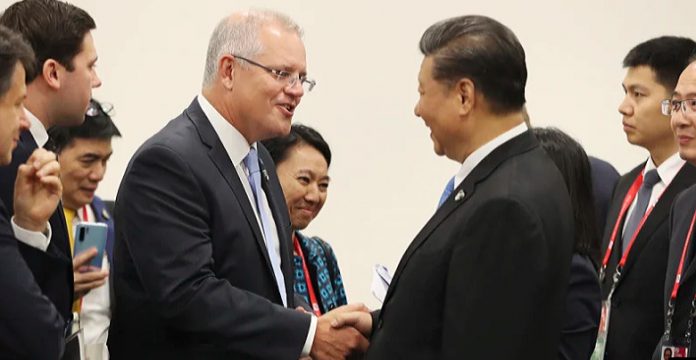In the past few weeks, tensions between Australia and China have escalated with the Australian Prime Minister Scott Morrison as well one of his colleagues — Health Minister Greg Hunt — seeking an enquiry into the origins of the coronavirus. At a recent press conference however, Hunt announced that as a result of intervention from Andrew Forrest, who is the CEO of the Fortescue Metals Group, Australia had managed to obtain 10 million COVID-19 testing kits. Significantly, the Health Minister while contradicting his previous stand and that of PM Morrison, stated that the Australian government does not believe that the virus actually began in a wet market in Wuhan. Much to the surprise of many observers, China’s consul general to Victoria, Long Zhou was also present at the press conference. The Chinese diplomat said that relations between both countries are deep and China providing testing kits to Australia was a reiteration of the same.
While in recent days, both Beijing and Canberra have made attempts to reduce bilateral tensions, Australia’s repeated calls for an inquiry have riled China. Chinese Ambassador to Australia Jingye Cheng in a media interview stated that Australia may have to face strong economic repercussions, including the boycott of Australian goods like wine and beef by China . The Chinese diplomat in an interview also stated that if hostilities between both countries continue to rise, Chinese students may think twice before choosing to study in Australia.
Hu Xijin, the editor of the state-run Global Times was also critical of Australia, accusing it of blindly buying Washington’s argument regarding the origin of the coronavirus. The article went to the degree of dubbing Australia as “gum stuck to the bottom of China’s shoe,”.
Beijing had also tried to put the Australian government in a spot by leaking a telephonic conversation with the Secretary of the Department of Foreign Affairs and Trade (DFAT) who stated that he did not know about the demand for such an enquiry, and it was an inappropriate time to demand the same.
China-Australia economic ties
China is Australia’s largest trading partner with bilateral trade estimated at $235 billion in 2018-2019, and Chinese students are the largest group within the international students. The number of Chinese students in Australia in 2019 was estimated at 2 million out of which 1.7 million were enrolled in higher education courses and contributed an estimated 12 billion AUD to Australian economy.
Australia’s support for Taiwan
In addition to backing the demand for an enquiry into the origins of the coronavirus, Australia has recently expressed its support for Taiwan’s participation in World Health Organisation (WHO) meetings as an observer. A spokesperson for the Australian Department of Foreign Affairs and Trade stated that the country supports the participation of Taiwan in the WHO as an ‘observer/guest’.
Taiwan was allowed to participate as an observer in WHO meetings till 2016; ever since the election of Tsai Ing-wen, Beijing has objected to the participation of Taiwan. European Union, United States, Japan and Australia have been calling for Taiwan’s participation as an observer at the WHO, citing the fact that due to its proximity to China and experience in combatting SARS, it could provide important suggestions for making the fight against the coronavirus pandemic more effective. It would be pertinent to point out that Taiwan claims that it had informed WHO about the outbreak of the virus, but it refused to take note.
In recent years, Australia while maintaining its strong economic relationship with Beijing has also begun to take steps which seek to check China’s growing economic and political clout in the country. First, like other members of the Five Eyes alliance, apart from the UK, Australia refused to allow Huawei participation in its 5G network on security grounds. Second, Australia has made it compulsory for Foreign Direct Investments even below $175 million by countries with which Australia has signed Free Trade Agreements (FTA’s) to be scrutinized by the Australian Foreign Investment Review Board. This new policy is aimed at checking China’s growing economic influence in Australia. Earlier, even investments in sensitive sectors like defense and telecom by countries with which Australia has signed FTA’s were not scrutinized. Since the past few years, a number of Chinese companies have not only been increasing their stakes in Australian companies, but also eyeing projects which are strategically important. In 2015 for instance, Landbridge Group won a 99-year lease for Darwin Port which is strategically important for Australia.
The need to reduce tensions with China
At the same time, Australia cannot lose sight of its economic interests. Australian PM Morrison acknowledged this point. Apart from industrialist Andrew Forrest, media mogul Kerry Stokes in an interview published on the front page of the “West Australian” argued that Australia needs to mend its ties with China. Stokes added that further tensions with China would have catastrophic consequences for the country.
Australia is not the only country which has been taking a strong stance vis-à-vis China especially in the context of the coronavirus — US, UK and France too have been critical of Beijing for not being transparent with other countries with information pertaining to the coronavirus. At the same time, Australia, like many other countries, also needs to keep a close watch on its economic interests and is not in a position to adopt an excessively aggressive posture vis-à-vis China. Australia’s task is thus clearly cut out in terms of striking a balance between safeguarding its economic interests as well as strategic goals.
The views and opinions expressed in this article are those of the author.

Tridivesh Singh Maini is a New Delhi based analyst interested in Punjab-Punjab linkages as well as Partition Studies. Maini co-authored ‘Humanity Amidst Insanity: Hope During and After the Indo-Pak Partition’ (New Delhi: UBSPD, 2008) with Tahir Malik and Ali Farooq Malik. He can be reached at [email protected].


